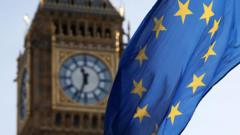The EU's Court of Justice has ruled Malta's golden passport scheme, allowing residency through financial investments, breaches European law, raising concerns about legality and broader implications for citizenship regulations.
Malta's Golden Passport Scheme Violates EU Law, Rules Court

Malta's Golden Passport Scheme Violates EU Law, Rules Court
EU's top court deems Malta's citizenship-by-investment program illegal, creating tensions over national sovereignty and financial practices.
Malta's controversial golden passport initiative, which permits foreign nationals to gain citizenship in exchange for significant financial investment, has been declared illegal by the European Union's highest court. The scheme requires foreigners to pay a minimum of €600,000 (approximately £509,619), invest in property, and contribute an additional €10,000 to charity, granting them the right to live and work across the EU.
The ruling arose after the European Commission initiated legal proceedings against Malta in 2022, asserting that the program essentially transformed citizenship into a mere commercial transaction. The court highlighted that the acquisition of EU citizenship must not arise from financial exchanges, thus posing challenges to the integrity of the citizenship framework within the bloc.
In light of the decision, Malta’s government has yet to provide an official response, though former Prime Minister Joseph Muscat characterized the ruling as politically motivated and suggested potential adjustments to the scheme could allow its continuation. Malta's insistence on its adherence to EU treaties has previously been a point of contention, particularly in light of growing scrutiny from the EU regarding investor citizenship initiatives.
The court's decision starkly contrasts with a prior opinion from the court's Advocate General, who maintained that EU law does not mandate a "genuine link" between individuals and a member state for citizenship eligibility. This divergence emphasizes ongoing debates surrounding member states’ rights to regulate nationality.
Moreover, the court expressed that Malta's citizenship program undermines trust and cooperation among EU countries. The European Union has previously highlighted investor citizenship schemes as potentially harboring risks related to security, money laundering, and other criminal activities—concerns that have led to calls for an end to such practices across member states.
Malta, which had suspended the scheme for nationals from Russia and Belarus due to geopolitical tensions, now faces a risk of substantial fines if it fails to align with the court's ruling. As the country navigates these legal challenges, the future of its golden passport program remains uncertain, igniting discussions on the balance between national agency and European integration.


















